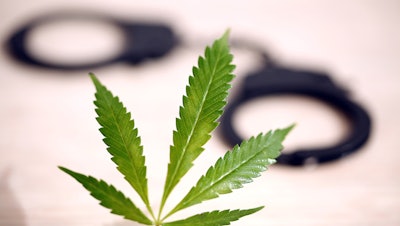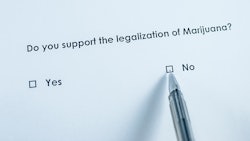
A coalition of Texas hemp business owners filed a lawsuit on Oct. 24 against the U.S. Drug Enforcement Administration (DEA) and local law enforcement officials after nine vape and CBD shops were raided on Aug. 27 in Allen. Allen is a city of roughly 100,000 people just north of Dallas.
The Hemp Industry Leaders of Texas (HILT) and Sabhie Khan, a 70-year-old man “who’s never been in trouble” other than a speeding ticket, according to the plaintiffs, filed the suit in the U.S. District Court of the Eastern District of Texas.
Khan operated a hemp retail business, Allen Smoke and Vape, along with his wife and son, capitalizing on a nationwide opportunity following the federal legalization of hemp in the 2018 Farm Bill. Khan required certificates of analysis for all products sold in his shop and “took great care” to comply with “all applicable laws and regulations,” according to the lawsuit.
However, in late August, Khan “sat in shackles in a jail cell without bond for two days,” according to the lawsuit. “This man was arrested for selling products that are legal in the state of Texas; in fact, legal across the county. The product—hemp. His customers—seniors, veterans and people struggling with pain.”
Khan’s shop was one of nine family-owned businesses that the Allen Police Department and the Collin County Sheriff’s Office raided with assistance from the DEA, according to the lawsuit listing these three entities as defendants.
During those raids, enforcement officials destroyed the business’ products, seized point-of-sale systems and records, and confiscated personal computers belonging to store employees, according to the plaintiffs.
RELATED: Allen Police Department, DEA Raid 9 Texas Vape Shops, Destroy Hemp Products
HILT, a grassroots organization of business owners founded on a singular mission to protect the interests of hemp businesses across the Lone Star State, filed the lawsuit alongside Khan with David Sergi as the lead lawyer.
“The DEA, Allen Police Department, and Collin County Sheriff’s Office targeted Mr. Khan’s small business, bringing the full force of the federal government, teamed with an aggressive, headline-seeking police department, and together they treated Mr. Khan like the kingpin of a drug cartel, despite hemp being legal,” Sergi said in a statement provided to Cannabis Business Times.
Sergi, a San Marcos-based hemp lawyer of Sergi & Associates, successfully stayed subpoenas from the DEA in late July, according to court documents from the Texas Eastern District, calling them a “blatant fishing expedition.” The DEA was attempting to “intimidate and bully these family businesses selling legal hemp,” Sergi said.
The search warrants executed on Aug. 27 of the nine businesses in Allen were in direct violation of Federal Judge Amos Mazzant’s order, staying enforcement of the DEA’s subpoenas, according to Sergi.
“The DEA used the Allen Police Department to do what it could not,” the lawsuit states. “Not only did the DEA fail to respond [to a motion to squash] but it went to great lengths to do an end run around a federal judge’s order.”
The stayed subpoenas came after law enforcement officials began targeting the businesses in May 2024, sending letters to various CBD and vape establishments in Allen stating that their businesses were selling “illegal THC products” in violation of state law, according to the lawsuit.
“We did multiple rounds of undercover operations, including sending minors in, and many of them were able to buy the THC underage,” Allen Police Chief Steve Dye told CBS News Texas in August. “And then we started testing those products and we found that the vast majority of those products were well over the 0.3 percent.”
Specifically, the Allen Police Department claims products sold by the shops in Allen had tested from 7% to 78% THC, The Dallas Morning News reported.
While the 2018 Farm Bill defines hemp as having no more than 0.3% delta-9 THC on a dry-weight basis, federal law requires hemp to be lab tested within a 30-day window before harvest time to determine whether it meets that threshold.
However, the 2018 Farm Bill does not include limitations on quantities, such as how much THC is extracted from plant material and infused into end products for consumers, international cannabis lawyer Rod Kight, owner of Kight Law Office, previously told CBT. For example, a 10-milligram delta-9 THC gummy can still meet the legal definition of hemp under the 0.3% Farm Bill definition
“The Farm Bill isn’t really about consumer products,” Kight said. “It’s really about farming and agriculture.”
RELATED: THCA in the Farm Bill: Amendment Goes Far Beyond Closing ‘Loopholes’
The plaintiffs in the Allen lawsuit maintain that law enforcement officials used discredited and questionable laboratory testing methods and standards as a basis for their search warrants.
The letters sent to Allen businesses in May claim they violated the Texas Health and Safety Code Section 443 regarding the “delivery of a controlled substance,” according to the lawsuit.
However, Texas Health and Safety Code 443.151 provides that as long as the hemp is tested before manufacture or processing, then “a consumable hemp product is not required to be tested” if each hemp-derived ingredient was already certified at a delta-9 THC concentration of not more than 0.3%.
“At the time of purchase by law enforcement prior to testing, products in Mr. Kahn’s store were legal,” the plaintiffs state in the lawsuit. “They had certificates of analysis performed at the time of harvest that were available to law enforcement to review.”
In other words, law enforcement officials sought a search warrant after testing a product that did not require further testing under state or federal law, Sergi said.
The lawsuit alleges that the Allen Police Department, under the direction of Police Chief Dye, violated the constitutional rights of Kahn and others because of the following actions:
i. the use of objectively unreasonable and inaccurate information.
ii. search and seizure of persons and property without probable cause or legal basis, such as a properly written warrant as required by law.
iii. the use of outdated, unreliable THC Presumptive Field Tests; and
iv. misunderstanding the law, regardless of complexity.
When law enforcement officers raided Khan’s business on Aug. 27, Khan said he felt “cornered” as police and sheriff’s deputies surrounded, questioned and arrested him, and took all of his company computers, personal laptop and iPad, and the business’s products, according to the lawsuit.
“Khan has been traumatized by his arrest and is now having trouble sleeping while being very nervous and guarded all of the time,” according to the lawsuit.
The officers took approximately $8,000 to $10,000 in legal inventory with certificates of analysis: about 60% was for delta-8 products, while about 25% was for THCA, and about 15% was for THCP and THCJD, according to the lawsuit.
“Mr. Khan, like other members of the Hemp Industry Leaders of Texas Hemp Industry Leaders of Texas are hard-working small businesspeople pursuing the American Dream,” HILT founder AJ Valador said in a statement provided to CBT. “Every day, Mr. Khan and our members, many running minority-owned businesses, provide a much-needed and legal product to their community assisting people with challenges resulting from PTSD and physical pain.”



























